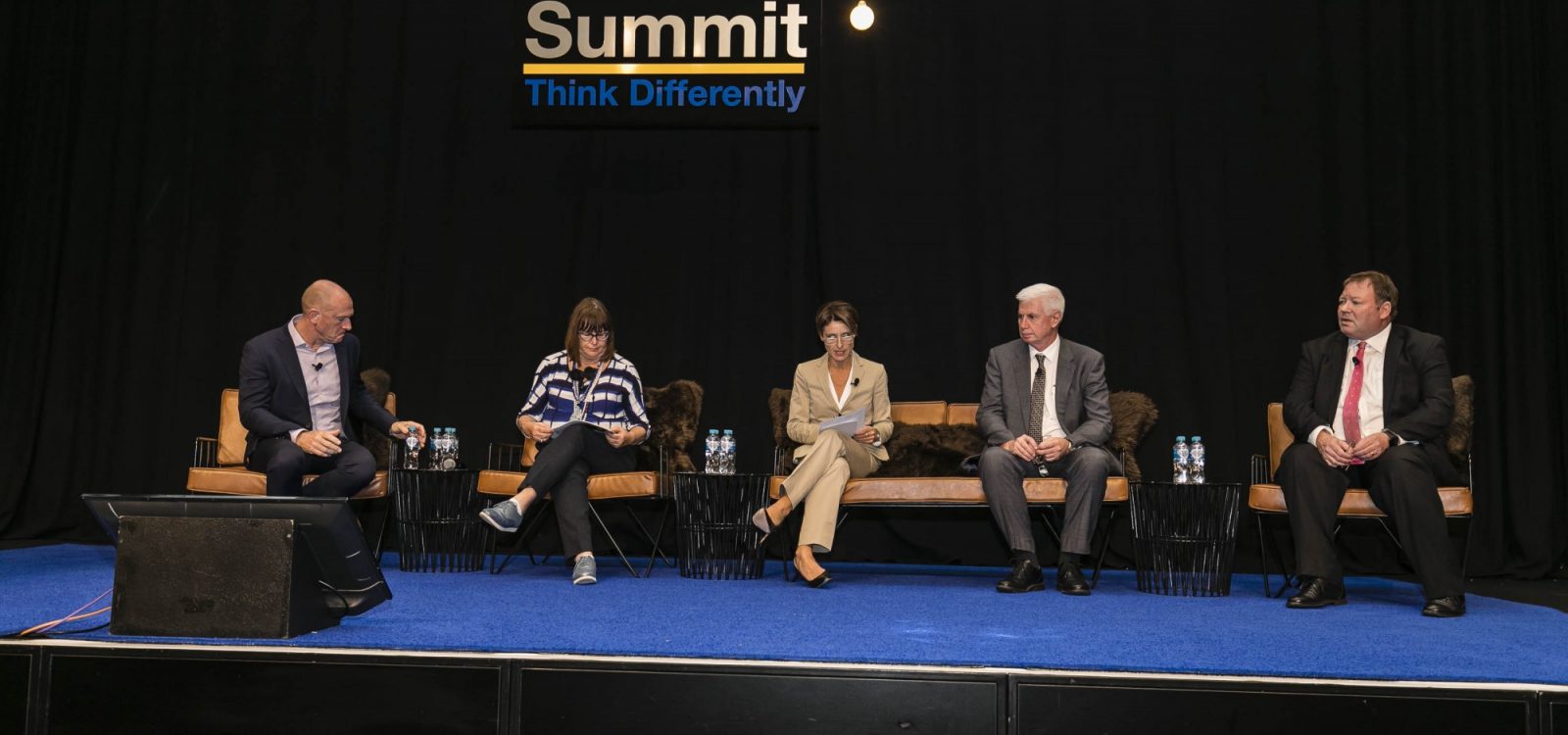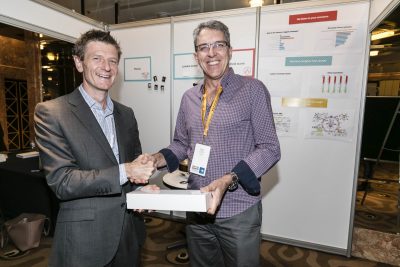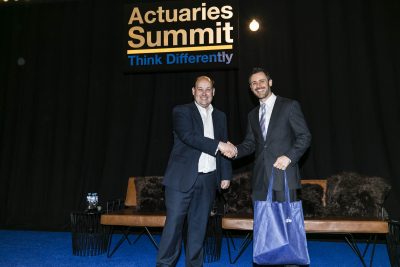
Day Two of Summit 2017
Day Two of the 2017 Actuaries Summit brought together a range of ideas affecting actuaries and the industries they work in. Here is a summary of the Day 2 Plenary and Concurrent sessions at the biennial event in Melbourne.
Day Two of #ACTSUM2017 kicked off with the Actuaries Institute Annual General Meeting. The Financial Report and Report of the Council and Auditor were discussed among President Jenny Lyon, CEO David Bell, Glyn Thomas (Company Secretary) and several attendees.

The first session of Day 2 was Plenary 4 – Think Differently about Mental Health. Dr Bill Monday (Pacific Life Re), Prof Niki Ellis (Monash University), Dr Derek Lovell (Psychiatrist) and Mick Stephenson ASM (Ambulance Victoria) spoke about the change in how society is thinking about mental health.
“It’s a difficult topic but the fact that we have come together to discuss it is a great initiative,” said Dr Bill Monday.
Facilitator Emma Alberici drove the Q&A session where some of the most pressing questions were asked such as ‘How do we make our future society more resilient to mental health issues? Does the government have a role?’
Dr Derek Lovell said “I think the community is the answer rather than government”, commenting that as a community we can work on programs that will support our future generations.
Shortly after morning tea, delegates made their way to a concurrent session of choice. Kim Cohen spoke about Building consumer trust in the life industry, something that is always relevant to all insurance actuaries.
Many delegates also joined Sarah Johnson for her session Insuring a better disability system part 2: transition to full scheme. An interesting topic especially after the budget update earlier this month.
Julia Lessing and Alice Truong from the Guardian Actuarial spoke about how actuaries can use their skills to help our community in their session: ‘They Need to Smile a Bit More: Perceptions of Actuaries from other Professionals in Non-Traditional Areas.’
One of the highlights was Richard Lyon’s comment during Q&A “We always berate ourselves for our poor communication skills but the distillation of value and insight on of extreme complexity is something we do probably much better than we give ourselves credit for”.
Concurrent 6 had a session for everyone.
Mark Griffiths and Nick Symons explored the question ‘How Can Life Insurers Optimise Customer Outcomes in a Low Yield World?’ Looking at the potential implications of low interest rates on Australian life insurers and the future outlook under different economic scenarios. In the session, ‘Better health outcomes‘, Caroline Stevenson and Anthony Maher outlined the use of actuarial techniques in driving efficiency in the healthcare sector. Meanwhile, Barry Leung asked if Australian private health insurance was affordable in his session.
Those interested to hear about the future of the profession joined Lesley Traverso’s session, ‘The Actuarial Phoenix’.
“The actuarial skill set is supremely suited to flexible working arrangements,” said Lesley.
Delegates then enjoyed a warm lunch catered by the venue and sat down to network and discuss the morning’s sessions.
Concurrent 7 was a collection of forward-thinking sessions that raised some questions for the actuary of the future. Paul Caputo and Kenneth McIvor spoke about the implication of the IAIS Insurance Capital Standard for various jurisdictions and the potential implications for Australia. Next door, Ruth Lisha spoke about room for GI and Life insurance streamlining, describing them as different sides of the same coin.
“Data science may be the catalyst to make actuaries change role or practice area,” said Ruth.
The advancements in the detection of cancer through liquid biopsies undoubtedly has some implications for the life insurance industry. Dr Bill Monday explored these potential impacts in his session. Continuing in health, Ellen Bruce, Matthew Crane, Kris McCullough and Jamie Reid teamed up to examine how thinking differently about risk equalisation will help create a more sustainable private health insurance industry. Jananie William also delved into the health space to talk about how we can use an actuarial approach to identify the risk factors of Australian maternal health costs.
‘Health’ proved to be a strong topic throughout the concurrent sessions, even as we moved into the final concurrent program.
In Concurrent 8, Body Hacking and the Quest to Cure Death by Greg Solomon updated delegates on biohacking and the medical discoveries we’re making as a result.
Rosi Winn, Anjali Napoli and Mike Clough spoke about ‘Actuaries working to support public policy –developments in social welfare and beyond’. Avanti Patki and Nathan Colbert’s presentation outlined the versatility of the actuarial skillset.
“The way forward for the profession is applying our actuarial toolkit to a myriad of problems, where we do this is up to us.”
Marc Mer and Basem Morris explored the details of data analytics and capturing massive amounts of data for insurers.
“Data analytics is all about finding correlations but you need to understand the context. You can’t assume causation from correlation.”
In the Final Plenary – Think Differently about Change, Henk Kleynhans (CBA), Jason Wilby (Huddle) and Glen Rabie (Yellowfin) discussed the biggest buzzwords of 2017, engaging in the changes with AI, automation, the changing nature of insurance and data science.

“AI will have the most immediate impact on our lives in the field of transport…AI will make driving cheaper, faster and better” said Henk, concluding with the question “how can we create better behaviours?”
The Q&A that followed brought to light some concerns around analytics, the ownership of data, moral decisions made by driverless cars and the inability to automate everything.
As Emma Alberici then wrapped up the final Plenary, she said “it’s been a pleasure to be here, it certainly challenged me to think differently”.
President Jenny Lyon closed the Seminar, highlighting the rich discussion that took place over the two days and how ‘people’ were at the centre of it all. “We’ve talked about people just as much as AI at this conference”
She went on to thank Emma, Silver Sponsors (RGA, Munich Re, Pacific Life Re and Willis Towers Watson), Bronze Sponsors (SKL, Gen Re and Talent Insights), the Summit Organising Committee (pictured above) and HQ staff.
Congratulations to Rowan Ward (Munich Re Prize winner), Nathan Colbert (Gen Re Prize winner) and Leon Yan (Gen Re Prize runner up).
CPD: Actuaries Institute Members can claim two CPD points for every hour of reading articles on Actuaries Digital.








